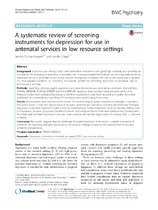| dc.description.abstract | BACKGROUND: In low resource settings, short, valid and reliable instruments with good high sensitivity and specificity are
essential for the screening of depression in antenatal care. A review of published evidence on screening instruments for
depression for use in antenatal services in low resource settings was conducted. The aim of this review was to appraise
the best available evidence on screening instruments suitable for detecting depression in antenatal care in
low resource settings.
METHODS: Searching, selection, quality assessment, and data abstraction was done by two reviewers. ScienceDirect,
CINAHL, MEDLINE, PubMed, SABINET and PsychARTICLES databases were searched using relevant search terms.
Retrieved studies were evaluated for relevancy (whether psychometric data were reported) and quality. Data were
synthesised and sensitivity and specificity of instruments were pooled using forest plots.
RESULTS: Eleven articles were included in the review. The methodological quality ranged from adequate to excellent.
The review found 7 tools with varying levels of accuracy, sensitivity and specificity, including the Edinburgh Postnatal
Depression Scale, Beck Depression Index, Centre for Epidemiologic Studies Depression Scale 20, Hamilton Rating Scale
for Depression, Hopkins Symptoms Checklist-25, Kessler Psychological Distress Scale and Self-Reporting Questionnaire.
The Edinburgh Postnatal Depression Scale was most common and had the highest level of accuracy (AUC = .965) and
sensitivity.
CONCLUSION: This review suggests that the Edinburgh Postnatal Depression Scale can be a suitable instrument of
preference for screening antenatal depression in low resource settings because of the reported level of accuracy,
sensitivity and specificity. | en_US |

